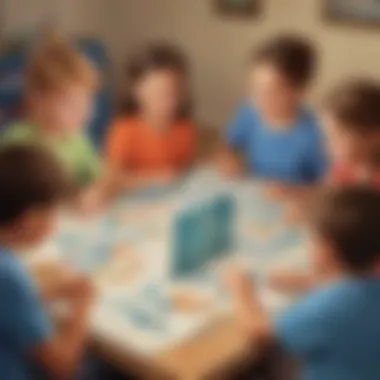Exploring Engaging Word Games for 5-Year-Olds


Intro
Word games play an essential role in developing early literacy skills in children. For five-year-olds, engaging with language through play can promote cognitive growth and broaden their vocabulary. This guide focuses on the significance of various word games, detailing educational benefits and introduction techniques for parents and educators. Each segment will illustrate how to make learning enjoyable while fostering a love for words in young children.
Creative Activities
Engaging with word games through creative activities can provide a stimulating environment for young learners. Crafting stimulating experiences dovetails with educational needs, as children learn by doing and creating.
Craft Ideas
Here are some approachable craft ideas that children can partake in:
- Word Collages: Collect images from magazines representing various nouns. Assist children in cutting out the pictures and gluing them on paper to represent specific words.
- DIY Alphabet Book: Invite children to design a small book featuring each letter. They can draw or paste pictures under each letter representing words beginning with that letter.
- Story Stones: Paint small rocks with different pictures or words. Players can select a few stones and create stories based on their choices.
Step-by-Step Guides
Each of these activities has application possibilities that cultivate language skills. For the DIY Alphabet Book, the steps include:
- Gather materials: assorted paper, crayons, and of course, a stapler.
- Guide the child to fold the paper in half to create a book.
- Assign letters for each page and encourage creativity in illustrations.
- Assemble and illustrate the book by writing the letter and drawing pictures.
Educational Value
Craft activities not only spark creativity but also embed fundamental literacy milestones. By engaging in these activities, children expand their vocabulary and learn letter-writing skills. Further, they enhance fine motor coordination, an essential precursor to writing.
Fun Quizzes
Interactive quizzes expand children's understanding of language through captivating content. This form of engagement keeps them absorbed while facilitating learning.
Quiz Topics
Quizzes available on platforms such as ElemFun may cover various topics, such as:
- Animal names
- Common sights in cities
- Colors and shapes
- Verbs often used in daily communication
Question Types
To keep children engaged, quizzes utilize various question types:
- Multiple choice questions that challenge vocabulary comprehension.
- Matching tasks that involve connecting words with corresponding images.
- Fill-in-the-blank exercises aimed at reinforcing contextual understanding.
Knowledge Reinforcement
Quizzes serve as valuable tools for reinforcing knowledge acquired through games and activities. This creates a space for children to reflect on their learning outcomes. Children can become more confident in their language skills and express themselves clearly.
Fact-Based Articles
Informational articles enhance students' background knowledge in engaging ways, making learning both specific and enjoyable.
Topics
Articles can include a wide range of topics, from animals to history, providing a thorough base of comprehension for five-year-olds. All provide opportunities for inquiry into worlds beyond their immediate conditions.
Engaging Content
The articles must remain engaging and simple. Visually appealing formats alongside adequate sizes of illustrations help facilitate easier comprenderstion. Illustrating new concepts encourages curiosity in children, making complex ideas accessible.
Foreword to Word Games
Word games represent a fundamental segment of learning tools for five-year-olds. Engaging in these games nurtures critical skills tied to language development. Play is not merely leisure; it is a vital mechanism through which children acquire knowledge. When children participate in word games, they build vocabulary, enhance spelllling skills, and develop a foundation for advanced language comprehension.


The Importance of Play
Play is essential in early childhood education. Through play, children explore their interests and experiment with new ideas. Research demonstrates that play facilitates various cognitive as well as social development aspectss. Children learn best when they feel comfortable and are allowed to have fun. Word games encourage creation and imagination. This encourages children to express when practicing their language skills. The simplicity and challenge of word games provide a productive balance between learning and enjoyment.
As children play, they also develop key skills such as collaboration and turn-taking. Shared play facilitates social competence and builds interpersonal relationships. Those collaboration skills are vital for future learning as well.
“Play is the highest form of research.” – Albert Einstein
Cognitive Development in Early Childhood
The early years are pivotal for cognitive development. Children undergo brain growth and maturation during this time. Engaging in word games can successfully promote cognitive skills, including memory, attention, and reasoning.
Games often simulate real-world problems for children to solve. Even at this young age, children learn the importance of strategizing as they guide their thinking in finding solutions. By creating exciting challenges, these games motivate children to think outside the box. The ability to think critically can be a transformative experience.
Additionally, as children learn new words, they build neural pathways in the brain that aid in processessing language more efficiently. This naturally enhances their ability to communicate effectively and understand what they read better.
In summary, the foundational aspects of cognitive growth take place in early childhood. Word games serve as an enjoyable and effective avenue for fostering language skills, emotional resilience, and social development.
Benefits of Word Games for Young Learners
Word games serve as an essential tool in education, particularly for young learners like five-year-olds. Children at this age are developing fundamental skills that will shape their future learning and social interactions. Engaging in word games is not just about fun; it benefits key developmental areas including language, cognitive abilities, and critical thinking.
Research indicates that children who participate in language-rich activities, such as word games, exhibit enhanced literacy skills and better academic performance in later years.
The potential benefits include:
- Enhanced Vocabulary: Word games introduce new words to children in an enjoyable context, promoting language acquisition.
- Improving Spelling Skills: Through playful engagement, youngsters get accustomed to the spelling patterns of words.
- Fostering Critical Thinking: Many word games encourage strategizing and problem-solving, which are essential skills in and out of school.
Understanding these benefits provides insight into how language development occurs in playful settings. It supports children's growth while maintaining the joy of learning, setting a positive foundation for future academic activities.
Enhancing Vocabulary
One of the foremost advantages of word games is enhancing vocabulary. Five-year-olds are naturally curious and eager to learn. By integrating word games into daily routines, children encounter a variety of words. Simple games like word searches or crossword puzzles can introduce children to terms they may not encounter in their everyday language. Consistent exposure solidifies understanding and usage.
Collaborative activities, for example, can further enrich vocabulary. When kids discuss their plans or try to guess words, it stimulates conversation and verbal problem-solving. Teaching them to relate new words with pictures or actions amplifies retention. Ultimately, increasing vocabulary supports communication skills essential for all facets of life.
Improving Spelling Skills
Spelling is another critical component that word games significantly improve. Consistent practice through lexicon games helps children learn spelling patterns. Games like Scrabble or simple rhyming exercises make learning enjoyable.
As children play, they gradually discover word structure. This awareness allows them to make educated guesses when encountering unfamiliar words. Moreover, settings like spelling bees or family-led spelling games can turn learning into quality social time, simultaneously enhancing bonds with peers or family members. Such playful contexts reduce stress often linked with traditional spelling tests, allowing for a relaxed atmosphere.
Fostering Critical Thinking
Word games also play a pivotal role in fostering critical thinking. Children must often strategize about possible moves, negotiate with teammates, or solve word riddles and puzzles. This interaction trains them to think abstractly and look for patterns. Competitions, while light and playful, can create important teachable moments, prompting kids to think about and reevaluate their strategies.
Engaging in these cognitive processes prepares youngsters for more complex thinking tasks as they advance in their education. When children learn to think critically while having fun, they establish a love for solving problems. Building these thought processes encourages creativity and analytic skills that will prove beneficial well into the future.
Ultimately, the combination of enhancing vocabulary, improving spelling skills, and fostering critical thinking reinforces literacy and cognitive development in a way that is engaging and effective for young learners.
Types of Word Games Suitable for 5-Year-Olds
Choosing appropriate word games for five-year-olds is crucial. At this stage, children are like sponges, eager to soak up new knowledge. Developing language skills through play not only makes learning enjoyable, but also cements foundational competencies. Word games can enhance vocabulary and comprehension, and facilitate critical thinking— all while children interact and have fun. Thus, placing the right games in their hands is paramount.
Word Puzzles
Word puzzles encourage children to think critically and logically. Activities such as crosswords, word searches, or jumbled words aid spelling while expanding vocabulary. Children often feel a sense of achievement upon solving a puzzle. This sense of accomplishment, however small, fosters confidence.
Moreover, word puzzles can be tailored to fit individual learning levels. Consider the use of simple two- or three-letter words for beginners. As children progress, introduce more challenging words. This gradual increase helps maintain their interest and enhances their cognitive development. Ensuring engagement is vital; thus, providing visually appealing puzzles with themes kids enjoy—like animals or favorite cartoon characters—can also enhance participation.


Memory Games
Memory games work splendidly for brain development and vocabulary. This activity often involves memorizen tracks quirky pairs, helping young ones improve retention skills. Traditional games like concentration with word cards can be excellent. This can develop not just language skills, but also their ability to focus.
In addition, memory games push children´s social interaction when played with others. Aggravating competition can lead to exciting learning within groups. When consisdering such games, use pairs that involve existing vocabulary and relevant interests, allowing kids to connect meaningfully.
Rhyming Games
Rhyming games are an excellent vehicle for phonetic understanding and pronunciation. Learning about sounds encourages young learners to form new connections between words. More advanced rhyming like creating silly poems or constructing playful sentences provides children a creative outlet too.
Implementing catchy little songs or rhyme-based storytelling can gravitate attention. This format nurtures language development thoroughly, as it makes the incorporation of language more enjoyable. Even showcasing classic nursery rhymes keeps children enthused while also establishing linguistic rhythm.
Word Association Games
Word association games are beneficial in expanding a child's thought process. They encourage youngsters to connect different words based on past experiences or contextual learning. Engaging kids in activities like wordchains (students take turns saying words that connect to the previous one) can provoke critical thinking. Such games can be seamlessly adapted to match learning styles and language proficiency.
Association also cultivates deeper understanding. Connecting words with concepts allows children to learn backed by comprehensive knowledge rather than rote memorization. Phrase-building exercises, either verbally or graphically, can enhance skills in sentence structure and grammar over time.
Ultimately, these word games are not merely tools for learning language skills. They immerse young learners in an engaging platform fostering a desire for knowledge. Therefore, introducing such variations effectively can provide lasting impacts on a child´s education.
“The right word games build a bridge to learning through engagement and play.”
How to Introduce Word Games to Children
Introducing word games to young learners carries great importance in their educational journey. These games should not merely be seen as entertainment; they enhance language skills while fostering a joyful love of learning. When parents and educators introduce these activities properly, they can cultivate an enriching environment that supports children’s cognitive growth.
Creating a Suitable Environment
A child-friendly space is crucial for effective learning. This environment should be free from distractions, engaging, and stocked with necessary materials. Consider making a dedicated area for word games with colorful posters, letter blocks, and other interactive tools. This notion will foster a sense of place for education while boosting their enthusiasm within that space.
For optimal engagement:
- Limit distractions like televisions or mobile devices when playing.
- Arrange materials visibly so that the child can see options.
- Incorporate comfort, such as cushions or small chairs where they feel relaxed.
A cozy setup can significantly enhance the experience and concentration of a five-year-old engaged in word games.
Using Familiar Words
Utilizing familiar vocabulary when introducing word games is equipped with benefits. Children tend to feel more comfortable and confident when they interact with words they already know. This recognition can scaffold further learning, as they build connections between new and existing knowledge.
For instance, incorporating their favorite cartoon characters or objects around them into these games makes the activities relatable and enjoyable. This can predictably stimulate participation and excitement, shining a light on the fun side of learning. Using familiar words ensures they not only participate but also learn more effectively without fear of making mistakes.
Incorporating Play into Learning
Play is a fundamental aspect of early childhood development, and word games can blend play seamlessly with important learning objectives. Making learning enjoyable not just captivates children’s interest but also embeds this learning in their daily thoughts.
Some ways to walk this balance include:
- Turn tasks into games. For example, turning a spelling task into a friendly competition.
- Use songs and actions. Incorporate movement, like clapping on syllables, thus embedding rhythm into learning.
- Encourage interaction between peers. Group games allow children to learn from one another.
Remember: The goal is to create a playful atmosphere where children can feel secure and eager to explore language through games.
Through these strategies, introducing word games can establish a solid foundation for language acquisition in children. This playful approach can make all the difference in developing a future interest in language.
Integrating Technology into Word Games
Integrating technology into word games presents an innovative approach to engage young learners. As children's familiarity with digital devices grows, harnessing such tools can enhance their learning experiences. This section discusses the importance of using technology to promote vocabulary acquisition and critical thinking.
The use of technology allows for a wide range of interactive word games that can motivate and excite children. This is vital at a young age since engagement directly impacts their learning spirit. Additionally, access to diverse resources can expand their exposure to new words. However, balance is fundamental. Parents and caregivers must guide technology use to ensure that it supplements, rather than replaces, traditional play-based learning.


Educational Apps and Online Resources
Educational apps offer a tailored experience that can adapt to an individual child's learning progress. Many applications are designed specifically for younger audiences, incorporating bright graphics and sounds. These elements not only hold the child's attention but also make the game compelling and fun.
Some popular apps include Endless Alphabet and Wordpop. These applications engage children with unique features that allow them to learn definitions, spelling, and usage through interactive play. While using these, caregivers should monitor screen time to maintain health and ensure learning remains at the forefront.
Furthermore, online resources such as PBS Kids provide various interactive games where children can explore word challenges. These games are often themed around familiar characters, making them more appealing.
In summary, educational apps and online platforms open new horizons, making learning vocabulary playful and engaging. Children's interactions with tools deepen their language skills and understanding, preparing them for future academic success.
Engaging Interactive Activities
Interactive activities play an essential role in merging technology with traditional word games. Activities that require active participation draw in young learners, making reading and writing enjoyable. For example, parents could create a digital storybook using apps like Storybird. This platform allows children to see their stories come to life, thereby increasing enthusiasm for vocabulary.
Incorporating fun quizzes through online platforms like Kahoot brings an interactive element to learning. Parents can create quizzes covering words and themes surrounding their child’s interests. This not only builds vocabulary but also encourages healthy competition.
Parents should also help create hands-on experiences. Crafting a personalized word search puzzle on devices can be both fun and instructional. Craft an exciting game that includes family and friends, thereby enhancing interaction while learning.
Engaging activities using technology can serve as a bridge for children between traditional word games and modern learning platforms.
Furthermore, integrating technology should not overshadow group and outdoor games. Digital and non-digital play must coexist to provide a holistic approach to learning. Training young minds using both resources can cultivate strong language skills, critical thinking, and creative expression.
Thus, leveraging technology for word games offers diverse solutions. While capturing attention and interest, these methods effectively deliver educational value, paramount in building a robust vocabulary that supports cognitive development.
Monitoring Progress and Adjusting Difficulty
It is critical to track how children progress in word games. Just like any skill, mastering language requires time and focused effort. By observing growth, parents and educators can better understand which concrete thinking skills are developing and where improvements are needed. This will give them insight into how effective the games are in helping children acquire vocabulary and language skills.
Assessing Vocabulary Growth
Assessing vocabulary growth is an essential part of monitoring progress in word games. It involves recognizing not just the number of words a child can identify but also their understanding of those words. Parents and educators may begin by maintaining a record of new words learned during play.
Here are some practical steps to evaluate growth:
- Keep a Logbook: Create a simple log where new words will be noted. Engage children in discussions about words, asking them to use them in sentences.
- Play Vocabulary Quizzes: Use questions based on recent games through fun quizzes, encouraging children to recall and use vocabulary.
- Observe Conversations: Listen for the use of new words during informal chats. Contextual usage indicates comprehension.
It is important that parents understand vocabulary growth is a gradual process. Small changes can lead to noticeable improvements over time. The intent is less about rigorous testing and more like a steady observation to see how well kids grasp new ideas as they play. This creates an encouraging atmosphere to build confidence.
Adapting Games to Individual Needs
No two children are alike. Adjusting word games to cater to individual needs can significantly enhance their learning experience. Each child emerges with their own interests, pace, and capabilities. Tailoring activities allows for maximized enjoyment and minimized frustration.
Here are some key considerations for adaptation:
- Skill Level: Recognize the current level of a child. Games can be modified by altering complexity, such as changing the word length in puzzles or using images for younger players.
- Interest Areas: Engage children with topics they enjoy. If a child likes animals, base a word game around that theme. This creates a stronger connection and enhances enthusiasm for learning.
- Learning Styles: Understand if a child learns better visually, audibly, or kinesthetically. Customize games accordingly, using cards for tactile engagement or songs for auditory learning.
Engaging in incremental pressures allows space for comfort on their learning journey while furnishing the necessary challenge does cold charms of reassurance that learning should involve fun.
In summary, monitoring progress and making appropriate adjustments are essential in word games. Both observing vocabulary growth and adapting games suit individual learners will create a stronger, more supportive environment.
Finale
The conclusion serves as an essential closing segment of this article on word games for young children. It encapsulates the core idea regarding the importance of engaging five-year-olds in word games and emphasizes the various benefits these games bring.
The Lasting Impact of Word Games
Word games create a solid foundation for language skills.
- They improve vocabulary and spelling.
- Encourage critical thinking and problem-solving.
- Foster a keen interest in learning.
Word games adapt to the child's level. This makes them both simple and challenging. Additionally, the positive experiences built through these engaging activities promote a love for learning. By recognizing alterations in vocabulary and developing cognitive abilities, parents and educators pave the way for ongoing academic success.
Engaging children in word games today may plant seeds for effective communication skills tomorrow.
Through word games, children develop socially as well. They can play those games with peers or family. This contributes to bonding and encourages cooperative learning experiences. Overall, the lessons learned during play go beyond simple words. It prepares children for a future filled with communication opportunities.
In dwellers of today's fast-paced life, where distractions are rife, it is crucial to prioritize purposeful play. In the end, embracing word games within playtime not only enhances academic skills, it lays a supportive groundwork for emotional and social maturity. Creating an environment where learning feels positive is what ultimately enriches the journey of a young learner's education.







